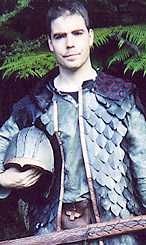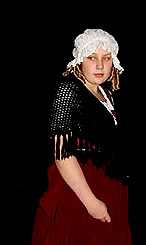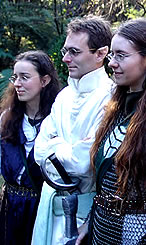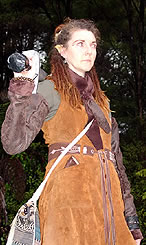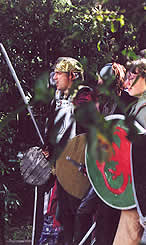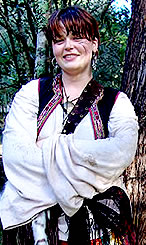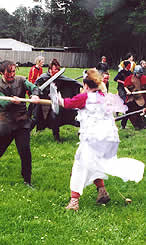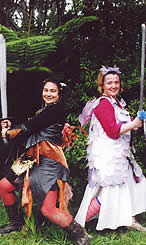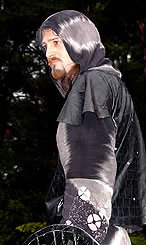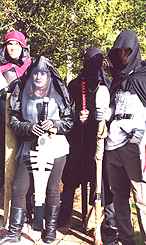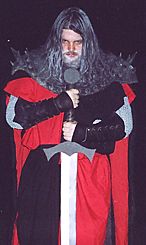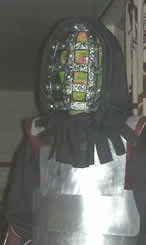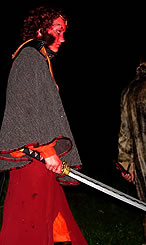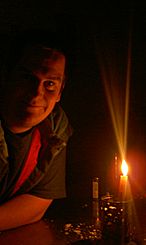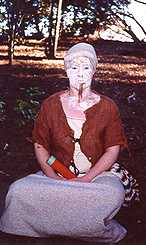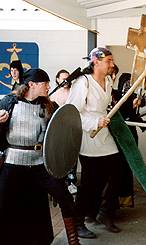 |
||||||||||||||||||||||||||||||||||||||||||||||||||||||||||||||||||||||||||||||||||||||||||||||||||||||||||||||||||||
|
The races of Mordavia meet at a crossroads of medieval fantasy, gothic horror, and fairytale.
Humans
 Humans are the most common race. Your settlements are well established, and your roads are used by all. From rich
burghers to poor serfs, from wild hill-men to ruthless slavers, humans span the whole range of medieval and fantasy lifestyles.
Humans are the most common race. Your settlements are well established, and your roads are used by all. From rich
burghers to poor serfs, from wild hill-men to ruthless slavers, humans span the whole range of medieval and fantasy lifestyles.
The native people of Mordavia are greatly varied. Travelling the road you might find a humble Alchemist peasant trading scrolls to make himself a living, alongside the spoilt child of a noble family, seeking glory and fame as an escape from the tedium of court life. In a land as dangerous as Mordavia, people from all walks of life will oftime band together against the adversity. The native culture is Slavic in flavour, with a strong resemblance to the Russian folk of old. Common garb for men is loose trousers that tighten below the knee, high boots or leg bindings, loose long-sleeved tunics that gather at the cuff, open waistcoats, rope belts, and dark hats or hair ties. Women are often seen in long coloured sleeveless dresses with a white loose-sleeved cuffless blouse underneath, and typically their hair is either tied in a snood (if married) or braided and decorated with a Russian maiden's head-dress. However there is great variety in garb, especially among adventurers. Some humans have come to Mordavia from neighbouring lands such as Romania, Russia, Turkey, or Germany (or the medieval counterparts thereof). Others are from far-flung parts of world like England or the East. Many of these immigrants would like to leave the horrors of Mordavia behind, but a strange magic prevents them leaving to the outside world. The world outside of Mordavia knows almost nothing of the magic, monsters, and horrors of this forgotten land. Fast Learner: you pick up new skills quickly. You gain two extra Experience Points at the end of each game. Elves
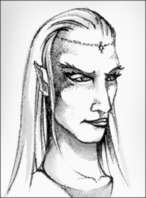 Elves are a graceful folk distinguished by pointed ears. Yours is a fading race, your forest homes increasingly engulfed
by the swamps and your population dwindling as a result of war with the orcs.
Elves are a graceful folk distinguished by pointed ears. Yours is a fading race, your forest homes increasingly engulfed
by the swamps and your population dwindling as a result of war with the orcs.
There are a number of small elven realms in the forests of Mordavia, from little Eneldorë in the west, to secluded Jurawicca in the north, with another dozen scattered throughout the land. In the past the elven lords have always been loyal in times of war and diligent in matters of tax, so the King of Mordavia gives them some leeway in terms of the titles they give themselves. Thus it is not uncommon to meet an elven "prince" of a "Kingdom" not much larger than the tiny forest around Berium. In olden days the elven forests were far larger, but the relentless onslaught of the orcs and the creeping tide of the swamp have taken their toll. Their woodland homes are high up in the boughs of ancient trees, where prying eyes and orcish scouts cannot find them. Despite these precautions, in the past decade several elven realms have been completely destroyed by orcish armies. The few elves who survived these massacres fled to the other elven homelands, or become homeless wanderers. It is said that the various elven realms are bound together by the elven sages, or prophets. These prophets, thought to be many hundreds of years old, travel between the woodland kingdoms and spread the ancient elven teachings. They teach unity with nature, patience, and grace, and unite the elves against the orcish onslaught. Elves are famed for their art, poetry, and music. Their style is revered by fashionable humans and frequently imitated, though usually poorly. Elven garb is usually made of sheer, flowing materials in natural colours. Noble elves sometimes wear togas in the old Roman style,influenced by the Roman forces that once occupied Mordavia. However they bring their own elven grace to these clothes, with greater use of colours, and patterns that use the leaf and flower imagery associated with elven crafts. Elven adventurers, who often spend years away from their homelands, may become influenced by the garb of other adventurers but bring to it their own flavour. Recently King Silvermoon of Jurawicca was convicted of murder (of an orc who had legal protection). This, combined with Jurawicca's refusal to acknoledge the King of Mordavia as their sovereign and pay taxes has led to some distrust of elves in general. They are now required to carry papers declaring their loyaly to the King of Mordavia. You can download the certificate here. Every elf must carry a copy, signed by their lord or superior. Iron Will – you are immune to mind control. Abilities such as Fear, Possession, and Fairy Dust have no affect on you. War with Orcs – your kind has been hunted almost to extinction by the orcs. You are in constant danger from these murderous brutes, and their numbers are growing. You have no trust in them or their half-orc brethren. Gypsies
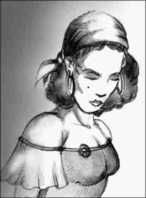 Most gypsies live in the wild, roaming freely. Civilised folk consider you filthy thieves and good-for-nothings. You cannot take the Noble or Guild advantages.
Most gypsies live in the wild, roaming freely. Civilised folk consider you filthy thieves and good-for-nothings. You cannot take the Noble or Guild advantages.
The gypsies of Mordavia are a nomadic, free-spirited people who set up camp wherever the omens are good. Sometimes they will lay down a camp one day, and be gone the next. Gypsy camp circles are protected from the restless dead by the subtle magics of their fortune-tellers. A camp can have as few as four members, and as many as twenty. A typical camp is led by a hunt-leader, who takes advice from the fortune-teller. Camps are an extended family related through the male line. It is said that every so often the various camps meet at a secret location for a moot. At the moot the hunt leaders exchange news of the world, while the younger gypsies drink and dance in a wild party that lasts for a fortnight, and the single men take wives from other camps. Mordavian gypsies are rather different to those in other countries. They have their own peculiar magics, and a strong affinity with the beasts of the forest. There is much bad blood between the gypsy folk and humans. Centuries ago, in the time of the folk heroes Paladin and Erana, a gypsy lord called Grymhallac rose up against the King. Grymhallac, also known as the Wolf King, wore a black crown that granted him immunity from mortal weapons. The crown was a gift from a mysterious and beautiful young woman, who seduced the gypsy and convinced him to seize control of the Kingdom and return it to wilderness. Grymhallac and his generals, all sons of his, led an army of gypsies and werewolves that almost destroyed civilisation in the Kingdom of Mordavia. It was Erana and Paladin who stopped him. Paladin raised a militia. He trained townsfolk across the land in the arts of warfare and equipped them to fight, and the militia succeeded in holding back the wild hordes for long enough that Erana was able to deal with Grymhallac. Since that time, the King has kept a standing army to protect against such uprisings, and from the dangers of the Orcs, wild hillmen, and the dead. The army still wears the uniform of Paladin's militia, which in turn is based on the armour of Roman soldiers who conquered the land in ancient times. It used to be that players who took the gypsy race were outcasts from gypsy society. This is no longer the case, however, gypsies who spend a lot of time with townsfolk should not expect to be popular with other gypsies. Most townsfolk consider gypsies sub-human, or at best thieving layabouts with no work ethic. There is also deep-rooted superstition about gypsies in the minds of townsfolk. Rumours of witchcraft and devilitry, and of unholy unions with animals and the theft of human babies abound. "You can't trust a gypsy" is a saying so well known that it hardly needs saying. Gypsies are usually blamed when townsfolk go missing. The clothing worn by gypsies is somewhat similar to that of humans, but often more flamboyant. Both men and women frequently wear coloured bandanas on their heads, and gold jewelry is all the vogue. Wild Evade: You are at home in the wild. You are able to disappear into the undergrowth, thereby evading those that persue you. If you are next to a plant that is taller than you, and there is no enemy on the same side of the plant as you, you can put your hands on your head and become concealed from all characters, including other gypsies. You cannot move or act until you become visible again by removing your hands from your head. You can perceive what happens around you while hidden. Fairies
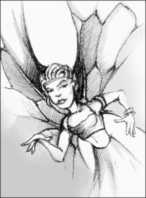 When you pass from the Land of Fairie to Mordavia you are enlarged from a tiny fairy to human size. Your wings
stop working when you are enlarged. You can never take the Tough advantage.
When you pass from the Land of Fairie to Mordavia you are enlarged from a tiny fairy to human size. Your wings
stop working when you are enlarged. You can never take the Tough advantage.
Fairies do not come from Mordavia, but from land of Faerie, which is not part of Earth at all. However, the only part of Earth that they can currently cross over to is Mordavia, due to the special magical properties of that kingdom. When a fairy is in the land of Faerie, it is tiny. When it crosses over to Earth, it becomes human sized. Reports of tiny fairies come from humans who have actually crossed over into the land of Faerie, often without knowing it. Once in Mordavia, fairies must pay taxes like everyone else if they wish to be protected by the law. Fairies tend to be a little close-mouthed about what the land of Faerie is like. They sometimes talk of missions from "Kings" or "Queens" or "High Councils" or the "Fairy Court", but the exact nature of fairy politics seems to be beyond human understanding. Some say there are two fairy courts, one light and one dark, that oppose each other in every action. However, even if this is true, no fairy will admit which of the courts they are working for. They may openly speak of coming to Mordavia to protect other fairies or gather mortal flowers, but many suspect they have stranger and darker motivations. They are also very reticent about exactly how they get back and forth between the realms. Fairy nobles can be lords either within Faerie or in Mordavia. Lords of Faerie are treated as foreign dignitaries in Mordavia, and therefore have the same privilages as local nobles. Fairy dress is typically gossamer, but more warlike fairies wear armour of their own beautiful design. Some fairy gear seems to be an everyday natural item, such as a chestnut shell or dining fork, greatly expanded in size to act as a helmet or trident. Wings: All fairies must have wings. Spell packets and weapons that hit your wings affect you. Fairy Dust: sprinkle glitter on the target and says “fairy dust” to make them do a task that doesn’t involve doing physical harm to themselves or others. Effect wears off after 1 minute. Fairy dust can only be used 3 times a day starting at midnight. Cannot be used on other fairies. Rogue Vampires
 The Vampire Lord who turned you has been destroyed or cast you off, freeing you from the mental domination of the
blood-bond. You can’t take the Righteous advantage or the White college of magic.
The Vampire Lord who turned you has been destroyed or cast you off, freeing you from the mental domination of the
blood-bond. You can’t take the Righteous advantage or the White college of magic.
The origin of the first vampire is lost in the dark of ancient times. But it is common knowledge that the most powerful vampires around today are the vampire lords, ancient and horribly powerful masters of the vampiric arts. Only vampire lords can create other vampires. When they create a new vampire from a human, it is enslaved to their will by the blood-bond, an inescapable form of mind control. The most powerful vampire lord today is thought to be Karina, known as the Vampire Queen, who held Berium Keep until a few years ago. Rogue vampires are vampire that have managed to escape the bond to their vampire lord. If a vampire lord is permanently destroyed, all of their bonded vampires become rogues. Also, if a vampire lord abandons one of their bonded vampires for whatever reason, that vampire becomes a rogue. However, if an abandoned rogue vampire ever comes in contact with the lord that created them, they are instantly dominated by the lord again. The place of vampires in Mordavian society is a strange one. They were once reviled in all forms, whether lords, bonded vampires, or rogues. However, in the last few years there has been an increase in the tolerance for rogue vampires. A great many townsfolk still harbour grave misgivings and dark superstitions about them, but as they have proven themselves time and again by fighting against the tides of darkness, the people are slowly coming around to think they may have a place in society. There are already several noble lords in Mordavia who are actually rogue vampires. The hidden influence of these nobles is also starting to sway the people away from their usual habits of concealing a stake under their tunics and greeting all strangers with a hearty meal of roast garlic soup. There is no "vampire nation" within Mordavia. Noble rogue vampires are lords (or relatives of lords) who rule under the King of Mordavia. To become a more powerful Blooded Vampire, a rogue vampire must drink fresh blood from a Vampire Lord. In this instance they do not become blood-bonded, but they are typcially putting themselves in a very dangerous situation, as Vampire Lords are without exception loathsome monsters who will use the rogue vampire any way they can. This is the price that a rogue vampire must pay to enhance their vampiric powers. Weaknesses – you cannot be healed by magic. If garlic or holy water touches your skin you suffer Knock Out for 1 minute. If your skin is exposed to sunlight you lose 1 Health Point immediately and a further 1 Health Point every minute that your skin is exposed. If reduced below 0 Health points you die. A hood will shade your face, but all other skin must be covered. If a person uses Righteous in your direction, you must move away from them. You can be killed by the Holy advantage and the Extreme Unction spell. Drain – by touching an incapacitated or knocked out humanoid on the neck you can kill them and return your Health Points to full. The victim cannot be undead. Your Armour Points are not affected. You can use Drain while incapacitated if can reach your victim with a hand. Fear – you may use the Fear ability three times a day starting at midnight. Shout “Run in fear!” and gesture towards a person or group. Unless they are immune to mind control, they must run away until they are out of sight of you. Mist – once per night you can turn to mist. It must be dark, with no greater illumination than candles or moonlight. Put your hands on your head to become mist. While mist you cannot be seen, touched, or affected by magic. You can remain mist so long as you are in the dark, and may move as much as you like. You can become mist while in combat. Immunities – poison, Fairy Dust, and sapping. Half-Orcs
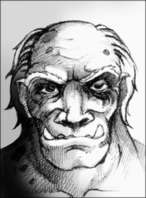 You are the offspring of human and orcish parents. You cannot start with Magic, Noble, Righteous, or Guild.
You are the offspring of human and orcish parents. You cannot start with Magic, Noble, Righteous, or Guild.
Half-orcs inherit the traits of both orcs and humans. They are still ugly, but human-looking enough to enter towns. Most half-orcs appear to be the offspring of matches between orcs and the wild hill people. The hillmen are rough and dirty groups of humans, subsisting as barbaric outlaws in the foothills of the mountains that surround Mordavia. They are often of strong build, wearing leathers and furs to protect them against the cold climate of the hills and boasting shaggy unkempt hair and beards. Orcs that come down from the mountains apparently form unions with these hillmen, although most hillmen will take great offense at the suggestion of this. Depending on whether the mother is orcish or human, the half-orc may be raised among the orcs in the mountains or with their human mother. Those raised by orcs typically have a very orcish lifestyle, living in the caves and coming out to pillage human and elven settlements. They may be somewhat more intelligent than the full blooded orcs around them, but not as tough. Half-orcs raised among humans may have a slightly gentler time of things, but even in hillman society they are likely to be scorned and reviled, and may be driven out of the settlement. They will have a hard time finding acceptance anywhere, and many end up living with bandits and other outlaws, where they are valued for their toughness. Some find their way into lawful settlements, and can even become Mordavian Citizens, although this is fairly rare. Half-orcs will dress like whoever they live with, but are often less concerned with appearances than humans. Ugly – your skin is green and lumpy. Use shades of green and brown makeup to augment your natural ugliness. Brute - you start with 3 Health Points. Dumb – while you are smarter than the average orc, intelligence and eloquence aren’t your strong points. You can only use words with one or two syllables. Demons
 Fleeing from a terrible frost that is spreading in the Demon Realm, your folk have come to Mordavia to start anew. You
cannot start with the Noble advantage or take the Black college of magic.
Fleeing from a terrible frost that is spreading in the Demon Realm, your folk have come to Mordavia to start anew. You
cannot start with the Noble advantage or take the Black college of magic.
Demons are still quite new as a common race in Mordavia, and they are finding their new home just as strange as the existing Mordavians find them. The demon realm is immensely hot, so demons find the mortal realm extremely chilly by comparison. In their demon realm their masters were the godlike demon lords, who resemble Nordic gods such as Thor, Loki and Odin. Demons find it unusual that mortal lords are so weak by comparison. Culturally, the demons have come from a dog-eat-dog world where power and standing meant everything and everyone was evaluated by their relative power. Their clothes often have a Nordic/viking influence and often incorporate fur, wool, and leather. Demons cannot pronounce the sounds "s" or "th". They pronounce both as "z", giving them a buzzing accent. Most of the refugees have come from the lands of Thor (who they call Zor), as his lands have been the most badly affected by the expansion of the Frost. Passage to and from the Demon Realm is via Astral Gates and the Recall spell, and is very dangerous. Demon Skin – your skin is red with angular black markings. Magical effects, including healing, are absorbed by your skin. The only magic that affects you is Fairy Dust because it is inhaled, and alchemical brews because they are taken internally. You must wear red makeup with black markings on all of your visible skin. Secrets – not all about you is as it seems. If you choose to play a demon you will be briefed on the details. Orcs
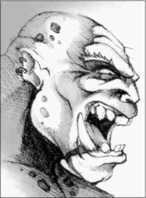 Orcs are stupid, smell bad, and have terrible table manners. They have become numerous and slaughtered many elves.
Their aggression makes them unwelcome in most towns.
Orcs are stupid, smell bad, and have terrible table manners. They have become numerous and slaughtered many elves.
Their aggression makes them unwelcome in most towns.
Nobody knows just how many legions of orcs dwell in their network of caves beneath the mountains that surround Mordavia. Even the orcs themselves are unsure, as they are divided up into tribal bloodlines and the endless feuds between them prevent any sort of central governance. Wild orcs are generally hostile to the Citizens of Mordavia. They pillage villages and waylay traders when they have the opportunity. However, some orcish clans have made pacts with the King and become seemingly loyal, and been granted Citizenship in return for paying taxes. These orcs have a hard time in the towns of Mordavia, where they are even more feared and reviled than the gypsies. In wild orcish culture the leaders are the strongest, most violent and fearless warriors. They lead by subjugating and belittling their fellows. Despite this rule by force, a kind of rough comradary can exist within an orcish warband, and they are quick to seek revenge on any that slay their fellows. Orcs can live in the harshest of environments, and can even travel through the swamp although they are loathe to stay in it for long. Their garb is typically very rough and dirty, as they care little for appearances or hygiene. Patches of leather roughly riveted together make up their usual armour. Little is seen or known of orcish womanfolk. Some speculate orcs breed in a hive like ants, with a single female producing great quanities of orcish spawn. If true, this must happen in the deepest mountain caverns where none but orcish eyes have seen it. Above all other creatures orcs hate elves, and the relentless orcish attacks on elven forest homelands have driven that fair race into hiding. Even the orcs themselves are hard put to explain the endless hate they have for "ulfs". The hatred simply seems to be bred into them. The orcish attacks seem particularly focused on destroying the elven noble families. Limitations: Orcs cannot take the Magic, Noble, or Righteous advantages. It may be possible for an orcish character to overcome some of these limitations of their culture, given sufficient opportunity during games. Very Ugly: Orcs must wear Orc masks or full facial prosthetics. They are typically bald with pronounced brow ridges, small horns, flat noses, and tusks protruding from their lower jaw. Their skin can vary from pinkish to grey, and may have a green tinge, depending on their clan. Their ears are somewhat pointed. You can borrow a mask for the game or make one yourself. We may also be able to help you make one - we still have the plaster negatives that were used to make our orc masks. Very Tough Skin: An orc's skin is hideously thick and leathery, so they start with 4 Hit Points. Orcs may also wear armour and take the Tough advantage to increase their HP. While all orcish player characters start with 4 HP, not all Orcs have hide as thick as this. Immature orcs or those from inferior clans are relatively thin-skinned by comparison, and may have as little as 1 HP, along with their armour. In times of desperation an orcish clan may send these weaker orcs into battle as cannon fodder. Such immature orcs are actually less durable than the average human. Very Dumb: Orcs are only slightly more intelligent than a wooden post. They can only use words of one syllable. While orcs are not book-smart or good with words, they can show cunning and be able to work well in a group to bring a plan to fruition. |
|||||||||||||||||||||||||||||||||||||||||||||||||||||||||||||||||||||||||||||||||||||||||||||||||||||||||||||||||||
